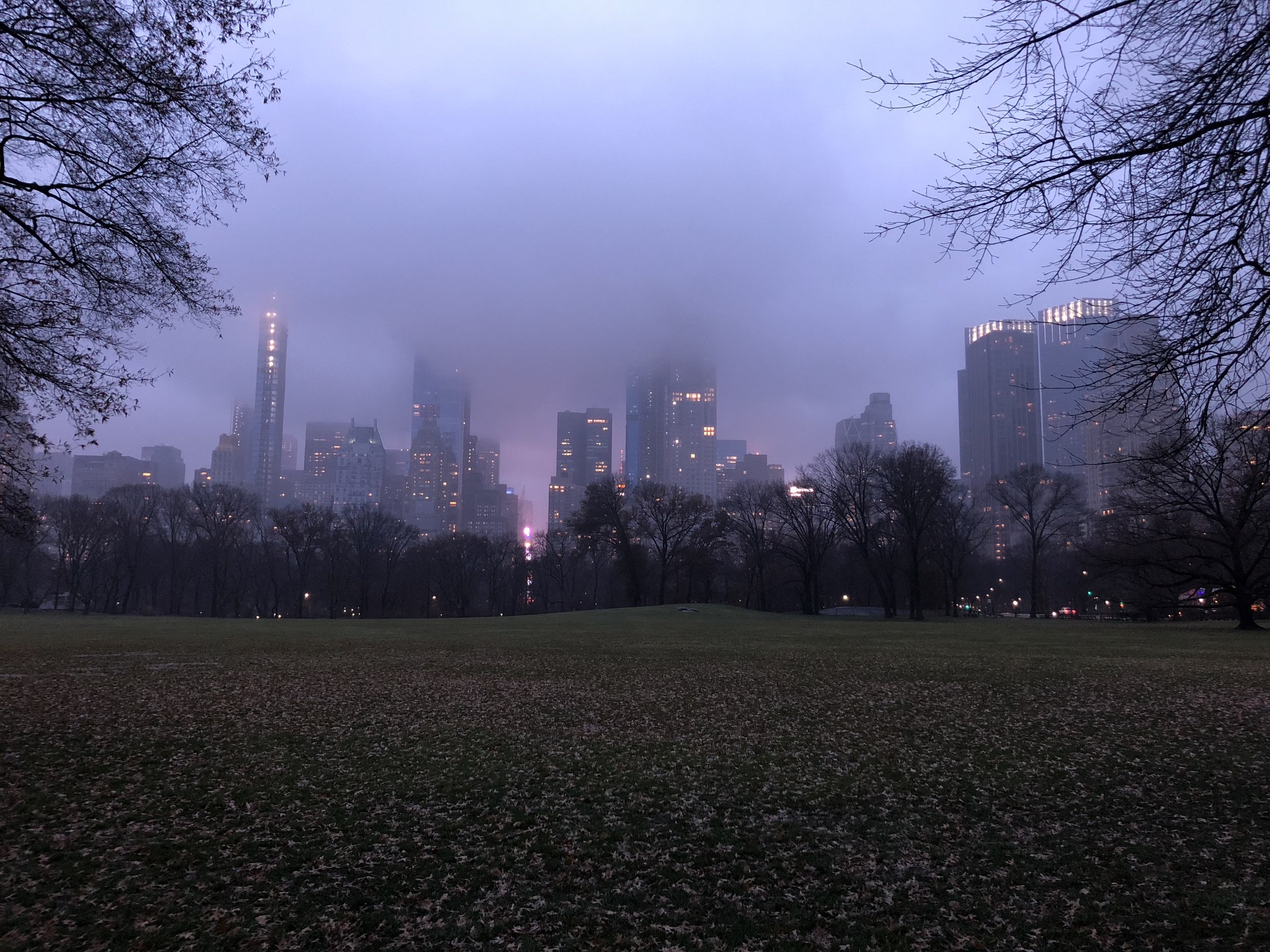Mastervoices, a 100-plus member chorus (originally founded by Robert Shaw in 1941), gave a concert on Friday night in Alice Tully Hall that seemed tailored to provide respite and consolation following what can only be described as an exasperating week in the "real world." It was a joyous evening, both because of the sheer number of performers onstage using their voices to lift all of us up, and through careful, thoughtful programming, and creative ingenuity.
PREVIEW: March in NYC
Exciting classical music events in NYC March 2019. Venues such as Bargemusic, 92nd St. Y, New York Philharmonic, Metropolitan Opera, Carnegie Hall, and more.
REVIEW: Pintscher Conducts Pintscher at the NY Phil
Matthias Pintscher is one of today's most successful composers, having won many European awards, and a busy conductor, too, serving as music director of Pierre Boulez's prestigious Ensemble Intercontemporain. This week he leads the New York Philharmonic in a program featuring one of his own compositions. On Thursday evening, however, the performance had not fully gelled. For example, at the iconic climax -- the trumpets hailing their triumphant theme in seven -- it took a few beats for everyone to agree on a tempo. Still, the piece's impact comes through, and the performance is worth hearing for the glittering reading of Ravel's Alborada and the spectacular violin playing of Renaud Capuçon. Hopefully, this brilliant soloist will be back (ideally with some more ingratiating repertoire) in the future.
REVIEW: NYFOS Celebrates Melting Pot of Living Composers in "Hyphenated-Americans"
The New York Festival of Song, in a program centering on the theme of America's cultural melting pot (in festive and artistic opposition to the xenophobia of the current administration), presented an entire evening of recently composed music by living American composers, "Hyphenated-Americans," who bring their disparate world heritage to the American musical voice. The formidable program had moments of spellbinding beauty; it also had moments that felt like work. But, it's valuable work, and no one does it better than NYFOS, who assembles a second-to-none roster of artists, and the rapt audience in Merkin Concert Hall on Wednesday evening was enthusiastic in their support for these "hyphenated," but undeniably American creators. The program's platter of highs and lows had moments of delicious surprises and surprising deliciousness.
REVIEW: Jaap van Zweden leads a glowing, hopeful German Reqiuem
Jaap van Zweden led a luminescent performance of Johannes Brahms'sA German Reqiuem, Op. 45, this week, in yet another change of gears for the New York Philharmonic's new conductor. Featuring the large Concert Chorale of New York, under the direction of James Bagwell, and soloists Ying Fang, soprano, and Matthias Goerne, baritone, Brahms's unique entry into the canon of the requiem mass glowed with a sense of hope.
REVIEW: "The Crypt Sessions" Brings a Moment of Revelation in a Crypt
One of the most powerful musical works to have emerged from World War II, Olivier Messiaen's Quartet for the End of Time, received a performance in the Crypt of upper Harlem's Church of the Intercession that delivered on its power. The sold-out event was presented by The Crypt Sessions, a chamber music series curated by visionary Andrew Ousley, and featured a ensemble of luxury talents, violinist Stefan Jackiw, alongside cellist Jay Campbell, Yoonah Kim on the clarinet, and Orion Weiss at the piano.
REVIEW: Stefan Jackiw and Conrad Tao Wax Nostalgic at 92Y
The 24 year old Tao is quickly rising to the fore as one of his generation's most promising -- scratch that, he's already delivering -- American classical musicians. This season alone, the New York Philharmonic gave the world premiere of a work entitled Everything Must Go, which they commissioned as a prelude to Bruckner's Eighth Symphony. I wasn't in town to hear it, but a visit to his website or youtube provides an enticing sampling of his talent, both as performer and composer. Stefan Jackiw's violin playing is transcendent. Like Tao at the piano, you forget that he's playing a specific musical instrument at all -- an antique mechanical device, miraculous, of course, but rife with idiosyncratic problems and hurdles to overcome. They both utterly disappear into the music, submitting completely to the composer's creation.
LOOK AHEAD: January in New York
New York’s 2019 Season is off to the races. NYC classical music in January, there are no fewer than three festivals focusing on new music happening immediately: The FERUS festival ; PROTOTYPE Festival. PROTOTYPE - OPERA l THEATRE l NOW; MAESTRO, A presentation of Ensemble for the Romantic Century at Duke 42nd; Carnegie Hall,; American Symphony Orchestra; New York City Opera; New York Philharmonic
RECAPITULATION: Top 10 List - Best of 2018
2018 was a big year for classical music in New York. A veritable who’s who of the world’s top performers graced our stages. Repertoire spanning the centuries was buttressed by a healthy supply of fresh, new work. Here is my contribution to the year’s end cornucopia of “Ten Best” lists, my ten favorite classical music moments in a year full of exciting concert-going.
REVIEW: Apollo's Fire Spreads Christmas Joy on Sugarloaf Mountain
Jeannette Sorrell's reminder that migrants, so much a part of the news in our current zeitgeist, are an integral part of the Christmas story -- and an integral part of what America is about, and where our traditions come from -- is given heartwarming affirmation in this inventive, moving event. The music, so brilliantly brought to life in this transcendent display of technical skill and subtle artistry, is like the sounds of our neighbors and, maybe, our ancestors, echoing from one end of the mountain valley to another. The audience, uplifted, seems to exit the hall inspired to be kinder, more mindful, and to embrace the true spirit of the holiday. What a gift.
REVIEW: CMS's Baroque Collection Transports to Another Time
Presented at Alice Tully Hall, CMS's Baroque Collection combines a museum-worthy curation of pieces representing some of the variety in the music of the time, the variety of musical forms, performance settings (sacred versus secular), and the increasing technical implications of the instruments for which they wrote. This year, the Chamber Music Society has assembled an impressive band of virtuosos to present a sumptuous feast that really immerses the audience in this musical world.
REVIEW: Sublime Singing and a Different Side of Jaap
Jaap van Zweden can do delicate too. His inaugural season as Music Director of the New York Philharmonic has burst out of the gate with bombast, shaking the roof of David Geffen Hall with an electric Rite of Spring, Bruckner's behemoth Eighth Symphony, and just last week, Shostakovich's explosive Seventh Symphony. But this week, the Maestro proves he can also maneuver in a lower gear. Joined by German baritone Matthias Goerne, an award-winning interpreter of German lieder commencing his artist-in-residency with the New York Philharmonic, van Zweden has fashioned an intriguing assortment of German and Austrian music, and a revealing peek of his approach to the traditional repertoire.



















